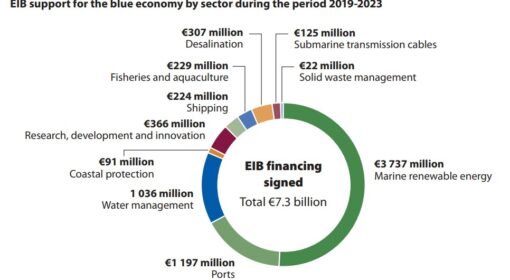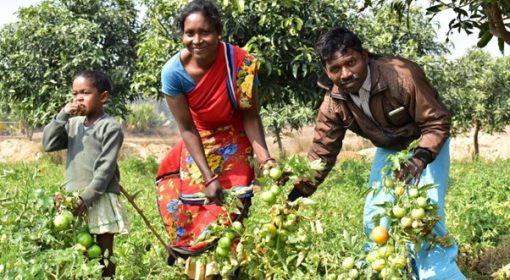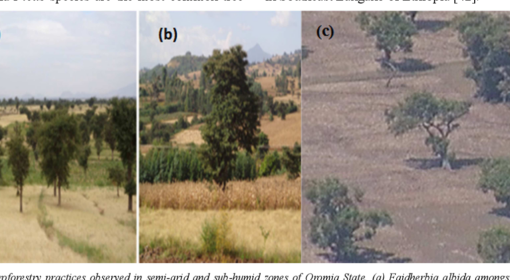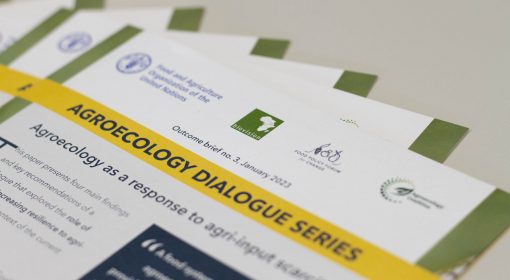By Inge de Willigen
The sustainability of the global conventional food system is under increasing scrutiny, with strong claims that it is fundamentally broken. In Lebanon, concerns about the food system are particularly pressing. Lebanon’s conventional agriculture is heavily reliant on costly external inputs, making it vulnerable to economic shocks1. The severe economic crisis that has gripped the country since 2019 has exposed these vulnerabilities. Food prices in Lebanon have increased by 396% in just one year1. As of early 2025, 30% of the Lebanese population faces food insecurity2. Adding to these challenges, the MENA region – including Lebanon – is among the most water scarce areas in the world3. At the same time, the Lebanese agricultural sector faces mismanagement of natural resources and inputs and an instable political environment, lacking supportive frameworks for sustainable initiatives4. In response to these challenges, MetaMeta Research is partnering with the Environment and Sustainable Development Unit (ESDU) at the American University of Beirut (AUB) to explore practices of Regenerative Agriculture in Lebanon.
What is Regenerative Agriculture?
Regenerative Agriculture (RA) is an approach to sustainable agriculture that arose in a context where every aspect of the global food system is questioned. The core principle is in its name: to regenerate a degenerative food system. RA thus goes beyond the idea of ‘doing no harm’ and aims to regenerate the whole food system, including soils, climate, crops, water, biodiversity, food security, human health and economic prosperity5,6,7. RA thereby sets off against conventional (degenerative) agriculture and belongs to a broader movement of agricultural approaches that respond to the rising demand for sustainable agriculture. Although there is no universally agreed definition for RA, soil health and biodiversity are seen as core elements5,7,8.
RA strongly links to agroecology, a sustainable agriculture movement rooted in food sovereignty1. MetaMeta works with RA as a subconcept of agroecology – which is among MetaMeta’s core themes. Agroecology is embedded in a broader socio-political context, but includes similar agronomic principles as RA.
Regenerative Agriculture: beyond a standard formula
There is no single prescribed way to regenerate a farm. So rather than regulating inputs, RA is guided by key outcomes that form its foundation. These outcomes are through principles translated into practices. The visual below shows RA, structured into three layers: Outcomes, Principles and Practices. The outcomes, shown in green, represent the ultimate goals of RA. The principles, shown in black, guide towards reaching the goals. In grey are examples of practices, (context dependent) specific actions that can be implemented to follow a principle and ultimately reach an outcome.
Let’s follow the visual. If, for instance, the outcome of soil health (green) is to be achieved, several principles need to be followed. It is for instance important to minimize soil disturbance (black). In order to minimize soil disturbance, there are several practices that could be applied. Examples are to practice zero tillage (grey) or to prevent over-grazing (grey).
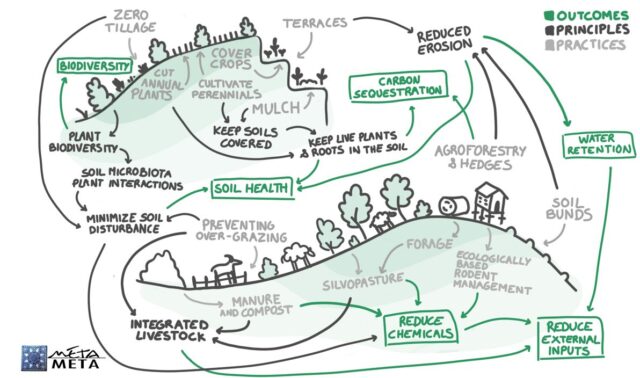
Loknowledge, global changecal
RA sees smallholder farmers in the driving seats of change and aims to reshape the food system from the ground up. It highlights the importance of local knowledge and interventions that are tailored to the local context3. RA thereby aims to reconnect farmers with each other and with traditional and innovative knowledge. Building, for example, farming communities again (like coops) strengthens the position of farmers in many ways4. Farming communities could provide for sharing of knowledge and inputs, such as machinery that is only needed a few times a year.
The project of RESOLVE
RA holds promising potential to revitalize Lebanon’s agricultural sector. To explore the opportunities and challenges, the RESOLVE project was launched in November 2024. RESOLVE – Resource Empowerment and Sustainability for Overall Community Vitality – aims to strengthen food security by mapping RA practices across Lebanon. By improving access to reliable data and practical knowledge, the project seeks to accelerate the adoption of RA methods and, in turn, enhance the resilience of rural communities. The project focuses on two key outcomes: 1) improved accessibility to data and information and 2) enhanced implementation of RA. In addition, RESOLVE will pilot a study on ecologically based rodent management (EBRM) to explore sustainable solutions for pest control, ultimately enhancing local agricultural productivity in varying environmental conditions.

References
- Saade, A., Hassan, R., & Ward, Y. (2022). Agroecology in Lebanon: Analyzing the current scene and exploring upscaling potentials. In
- World Food Programme. (2025). IPC Lebanon acute food insecurity.
- Goetz, A., Hussein, H., & Thiel, A. (2024). Polycentric governance and agroecological practices in the MENA region: insights from Lebanon, Morocco and Tunisia. International Journal of Water Resources Development, 40(5), 816–831. https://doi.org/10.1080/07900627.2023.2260902
- Jabbour, C., Saade, A., Ward, Y., Fahed, Z., & Maccise, K. (2023). Enabling Factors for the Adoption of Sustainable Agriculture in Lebanon.
- Giller, K. E., Hijbeek, R., Andersson, J. A., & Sumberg, J. (2021). Regenerative Agriculture: An agronomic perspective. Outlook on Agriculture, 50(1), 13–25. https://doi.org/10.1177/0030727021998063
- Elevitch, C. R., Mazaroli, D. N., & Ragone, D. (2018). Agroforestry Standards for Regenerative Agriculture. Sustainability, 10(9), 3337. https://doi.org/10.3390/su10093337
- Manshanden, M., Jellema, A., Sukkel, W., Jongeneel, R., Brazao Vieira Alho, C., de Miguel Garcia, A., de Vos, L., & Geerling-Eiff, F. (2023). Regenerative agriculture in Europe : An overview paper on the state of knowledge and innovation in Europe. https://doi.org/10.18174/629483
- Schreefel, L., Schulte, R. P. O., de Boer, I. J. M., Schrijver, A. P., & van Zanten, H. H. E. (2020). Regenerative agriculture – the soil is the base. Global Food Security, 26, 100404. https://doi.org/10.1016/j.gfs.2020.100404
